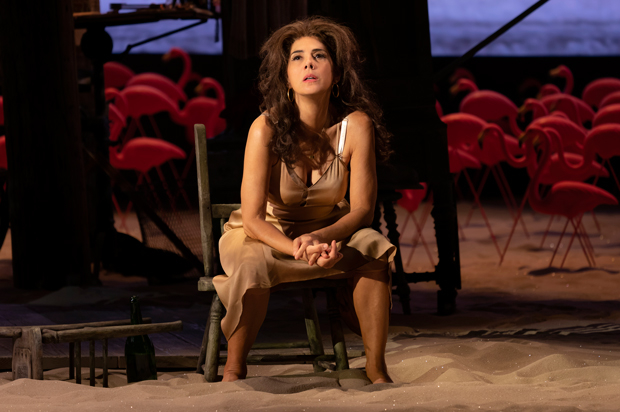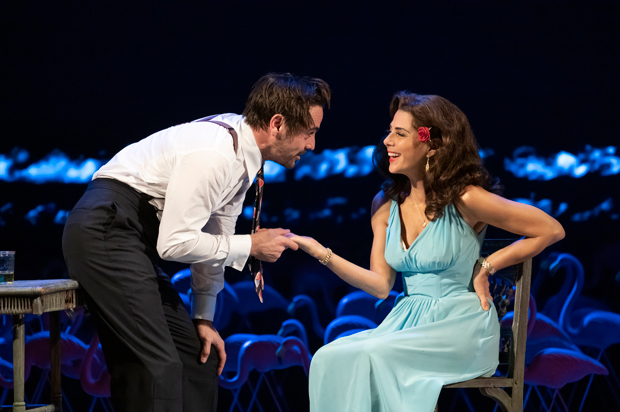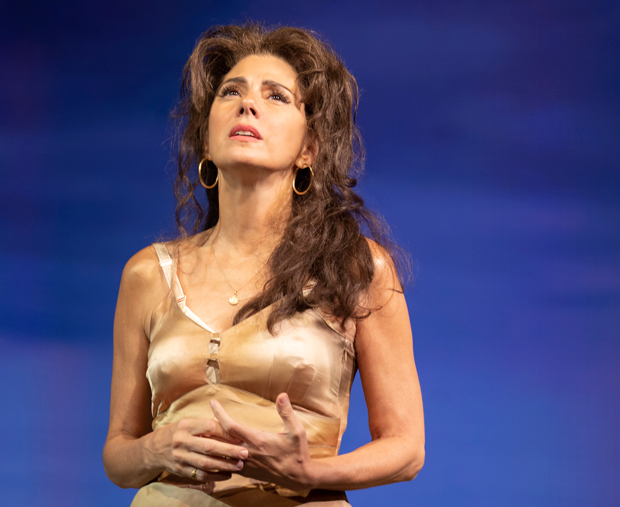Marisa Tomei Runs the Emotional Gamut in The Rose Tattoo
Roundabout Theatre Company presents a new revival of the 1951 Tennessee Williams play.

(© Joan Marcus)
Even more than in A Streetcar Named Desire and The Glass Menagerie, The Rose Tattoo shows Tennessee Williams letting his id fly free. In this 1951 play, he throws all his complicated thoughts about grief, sexual repression, and Catholic guilt into an unabashedly over-the-top stew. The only way to do justice to such proudly messy material is to wade deeply into its hysteria. That happens only intermittently in Roundabout Theatre Company's new revival of The Rose Tattoo, directed by Trip Cullman and starring Marisa Tomei.
Tomei plays Serafina Delle Rose, a Sicilian woman living on a seaside village along the Gulf Coast between New Orleans and Mobile, Alabama, with her daughter, Rosa (Ella Rubin). At the beginning of the play, Serafina, who makes her living sewing dresses, is still married to her husband, Rosario, who works as a truck driver smuggling drugs for a gang. But when he's killed one night on the job, Serafina goes into a tailspin of despair that lasts a whopping three years. Her overextended period of grief is exacerbated when one of her customers reveals that her husband had been having an affair with another woman before he died. Only when Alvaro Mangiacavallo (Emun Elliott) — whom Serafina describes as having "my husband's body, with the head of a clown" — enters the play's second half does she finally see a way out of her downward spiral.
As a character, Serafina contains multitudes: an animalistic life-force of a woman whose outwardly stormy manner belies the old-fashioned, deeply Catholic ideas about love and romance she clings to. It takes a certain kind of larger-than-life actor to bind all of the character's contradictions together by sheer force of personality. For all her comic skill, though, Tomei isn't fully successful at imbuing Serafina's emotional twists and turns with the kind of operatic heft that might make The Rose Tattoo rise above the level of a mere romantic comedy.

(© Joan Marcus)
Trip Cullman approaches the play in a similarly lightweight manner, which is why this production only really comes into its own when Alvaro enters. Tomei and Elliott — the latter charming in his awkwardness, even if he's too handsome for the role — develop a farcical comic rhythm with each other that makes their scenes effervescently enjoyable. But the play's more emotionally introspective elements get shortchanged: Even when Serafina howls with despair, one always witnesses her suffering at a remove, never quite feeling that the world is threatening to come apart at the seams the way the character herself surely feels.
It's telling that Father De Leo, a character in Williams's original text who appears at the beginning of Act 2, has been cut out of this production, thus curtailing the play's spiritual elements. Cullman's view of the play is earthy to a fault — too respectful of the text's surface to truly tap into its feverish inner irrationalities.
He's also cut out the mannequins Williams specified in his stage directions that haunt Serafina's home; instead, in Mark Wendland's set design, the back of the stage is populated inexplicably with kitschy pink flamingos, though they do fit in with Lucy Mackinnon's colorful scene-setting video projections of the Gulf Coast shoreline at different times of day. In addition to Fitz Patton's evocative sound design, the production features Italian folk songs in between scene changes, performed by some of Serafina's fellow village dwellers (Andréa Burns, Susan Cella, Ellyn Marie Marsh, and others) and by guitarist Jonathan Linden, that offer lyrical Greek-chorus-like commentary on the action.
All of this makes for an entertaining evening at the theater: a traditional production done professionally. But The Rose Tattoo, with its hairpin turns of comedy and tragedy, ought to feel more like an emotional roller coaster than it does here. A more daring director would have found ways to make it seem less dated and retrograde. Beyond offering a showcase for its star, this production leaves us wondering what made this Tennessee Williams play worth bringing back in the first place.

(© Joan Marcus)









